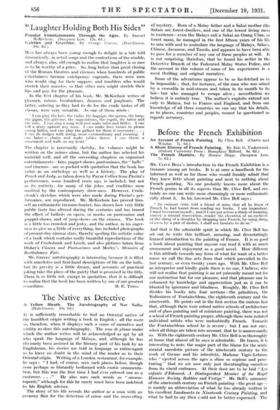Laughter Holding Both His Sides"
MAN has always been young enough to delight in a tale told dramatically, in acted songs and the contortions of the nimble, and always, alas, old enough to realize that laughter is so rare as to be worthy of a price. So, long before that great closing
of the Roman theatres and circuses when hundreds of public entertainers became catchpenny vagrants, there were men who would sing for their suppers, and tumblers who would stretch their muscles, so that other men might stretch their lips and pay for the pleasure.
In the first chapter of his book, Mr. McKechnie writes of gleemen, mimes, troubadours, dancers and jongleurs. The latter, catering as they had to do for the crude tastes of all classes, were very versatile. As one of them wrote :
" I can play the lute, the violin, the bagpipe, the syrinx, the harp, the gigue, the gitterne, the organistrum, the regals, the tabor and the rote. I can sing a song well and make tales and fables. I can tell a story against any man. I can make love verses to please young ladies, and can play the gallant for them if necessary. . . .
can do dodges with string, most extraordinary and amusing. I can balarne chairs and make tables dance. I can throw a somersault and walk on my head."
The chapter is necessarily sketchy, for volumes might be
written on the mimes alone, but the author has selected his material well, and all the succeeding chapters on organized entertainments—fairs, puppet-shows, pantomimes, the " halls" and cinemas —arc so packed with quotation that the book has value as an anthology as well as a history. The play of Punch and Judy, as taken down by Payne Collier from Piccini's performance, some hundred years ago, is included, but not in its entirety, for many of the jokes and crudities were omitted by the contemporary show-men. However, Cruik- shank's sketches which were also made during Piceini's per- formance, are reproduced. Mr. McKechnie has proved him- self an enthusiastic treasure-hunter, has shown how very little public taste has altered during the centuries and has traced the effect of ballads on opera, or masks on pantomime and
puppet-shows, and of peep-shows on the cinema. The book is a little too crowded and jerky, and the author, in his eager- ness to give us a little of everything, has included photographs of present-day cinema stars, thereby spoiling the artistic value of a book which contains really beautiful reproductions of the work of Cruikshank and Leech, and also pictures taken from Disher's Clowns and Pantomimes and Morley's Memoirs of Bartholomew Fair.
Mr. Graves' autobiography is interesting because it is filled with anecdotes and first-hand descriptions of life on the halls. but its gravity is a little dreary, and accounts of practical joking take the place of the gaiety that is promised in the title. There is so little wit, except in quotation, that it is difficult to realize that the book has been written by one of our greatest
B. E. TODD.


































 Previous page
Previous page